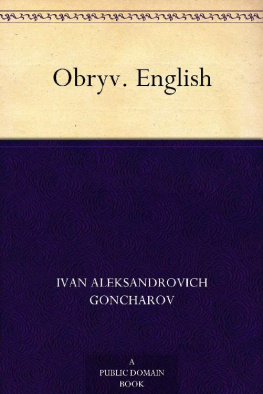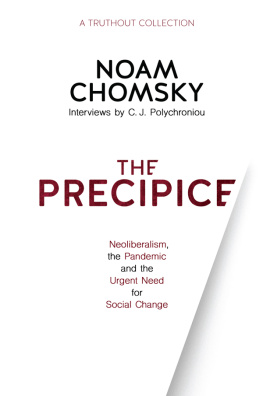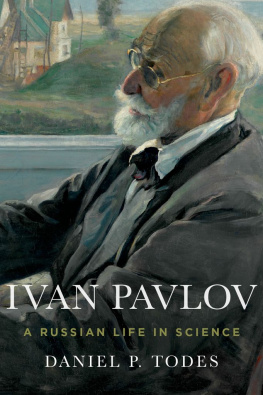THE PRECIPICE
by IVAN GONCHAROV
Original Russian Title: OBRYV
TRANSLATED FROM THE ORIGINAL RUSSIAN; TRANSLATOR UNKNOWN
[This text is condensed from the original.]
PREFACE
Ivan Alexandrovich Goncharov (1812-1891) was one of the leading members of the great circle of Russian writers who, in the middle of the nineteenth century, gathered around the Sovremmenik (Contemporary) under Nekrasov's editorshipa circle including Turgenev, Dostoyevsky, Tolstoy, Byelinsky, and Herzen. He had not the marked genius of the first three of these; but that he is so much less known to the western reader is perhaps also due to the fact that there was nothing sensational either in his life or his literary method. His strength was in the steady delineation of character, conscious of, but not deeply disturbed by, the problems which were obsessing and distracting smaller and greater minds.
Tolstoy has a characteristically prejudiced reminiscence: "I remember how Goncharov, the author, a very sensible and educated man but a thorough townsman and an aesthete, said to me that, after Turgenev, there was nothing left to write about in the life of the lower classes. It was all used up. The life of our wealthy people, with their amorousness and dissatisfaction with their lives, seemed to him full of inexhaustible subject-matter. One hero kissed his lady on her palm, and another on her elbow, and a third somewhere else. One man is discontented through idleness, another because people don't love him. And Goncharov thought that in this sphere there is no end of variety."
In fact, his greatest success was the portrait of Oblomov in the novel of that name, which was at once recognised as a peculiarly national charactera man of thirty-two years, careless, bored, untidy, lazy, but gentle and good-natured. In the present work, now translated for the first time into English, the type reappears with some differences. Raisky seems to have been "born tired." He has plenty of intelligence, some artistic gifts, charm, and an abundant kindliness, yet he achieves nothing, either in work or in love, and in the end fades ineffectually out of the story. "He knew he would do better to begin a big piece of work instead of these trifles; but he told himself that Russians did not understand hard work, or that real work demanded rude strength, the use of the hands, the shoulders, and the back," "He is only half a man," says Mark Volokov, the wolfish outlaw who quotes Proudhon and talks about "the new knowledge, the new life." This rascal, whose violent pursuit of the heroine produces the tragedy of the book, is a much less convincing figure, though he also represents a reality of Russian life then, and even now.
The true contrast to Raisky of which Goncharov had deep and sympathetic knowledge is shown in the splendid picture of the two womenVera, the infatuated beauty, and Aunt Tatiana, whose agony of motherly concern and shamed remembrance is depicted with great power. The book is remarkable as a study in the psychology of passionate emotion; for the western reader, it is also delightful for the glimpses it gives of the old Russian country life which is slowly passing away. The scene lies beside one of the small towns on the Volga"like other towns, a cemetery the tranquillity of the grave. What a frame for a novel, if only he knew what to put in the novel. If the image of passion should float over this motionless, sleepy little world, the picture would glow into the enchanting colour of life." The storm of passion does break over the edge of the hill overlooking the mighty river, and, amid the wreckage, the two victims rise into a nobility that the reckless reformer and the pleasant dilettante have never conceived.
Goncharov had passed many years in Governmental service and had, in fact, reached the age of thirty-five when his first work, "A Common Story," was published. "The Frigate Pallada," which followed, is a lengthy descriptive account of an official expedition to Japan and Siberia in which Goncharov took part. After the publication of "The Precipice," its author was moved to write an essay, "Better Late Than Never," in which he attempted to explain that the purpose of his three novels was to present the eternal struggle between East and Westthe lethargy of the Russian and the ferment of foreign influences. Thus he ranged himself more closely with the great figures among his contemporaries. Two other volumes consist of critical study and reminiscence.
CHAPTER I
Boris Pavlovich Raisky had a vivacious, unusually mobile face. At first sight he appeared younger than his years. The high, white forehead gave an impression of freshness and vigour; the eyes blazed one moment with intelligence, emotion or gaiety, a moment later they wore a meditative, dreamy expression, then again they looked young, even childlike. At other times they evidenced knowledge of life, or looked so weary, so bored that they betrayed their owner's age; at these times there appeared between them three furrows, certain indications of time and knowledge of life. Smooth black hair fell on his neck and half covered the ears, with here and there silver threads about the temples. His complexion had kept the tints of youth except on the temples and the chin, which were a brownish-yellow colour.
It was easy to guess from his physiognomy that the conflict between youth and maturity was past, that he had passed the early stages of life's journey and that sorrow and sickness had left their marks on him. Only the mouth, with its delicate lines, with the fresh, almost childlike smile remained unchanged by age.
He had been left an orphan in childhood, and for some time his indifferent, bachelor guardian had left his education to a relative, Boris's aunt.
This lady was endowed with a rich temperament, but her horizon did not stretch far beyond her own home, where in the tranquil atmosphere of woods and gardens, in the environment of the family and the estate, Boris had passed several years. When he grew older his guardian sent him to the High School, where the family traditions of former wealth and of the connexion with other old noble families faded.
His further development, occupations and inclinations led him still further from the traditions of his childhood. Raisky had lived for about ten years in St. Petersburg; that is to say he rented three pleasant rooms from a German landlord, which he retained, although after he had left the civil service he rarely spent two successive half-years in the capital.
He had left the civil service as casually as he had entered it, because, when he had had time to consider his position, he came to the conclusion that the service is not an aim in itself, but merely a means to bring together a number of men who would otherwise have had no justification for their existence. If these men had not existed, the posts which they filled need never have been created.
Now, he had already passed his thirtieth year, and had neither sowed nor reaped. He did not follow the same path as the other ordinary arrival from the interior of Russia, for he was neither an officer nor an official, nor did he seek a career for himself by hard work or by influence. He was inscribed in the registers of his police district as a civil servant.
It would have been hard for the expert in physiognomy to decipher Raisky's characteristics, inclinations and character from his face because of its extraordinary mobility. Still less could his mental physiognomy be defined. He had moments when, to use his own expression, he embraced the whole world, so that many people declared that there was no kinder, more amiable man in existence. Others, on the contrary, who came across him at an unfortunate moment, when the yellow patches on his face were most marked, when his lips were drawn in a sinister, nervous quiver, and he returned kindness and sympathy with cold looks and sharp words, were repelled by him and even pursued him with their dislike. Some called him egotistic and proud, while others declared themselves enchanted with him; some again maintained that he was theatrical, others that he was not to be trusted. Two or three friends judged otherwise. "A noble nature," they said, "most honourable, but with all its virtues, nervous, passionate, excitable, fiery tempered." So there had never been any unanimous opinion of him.










